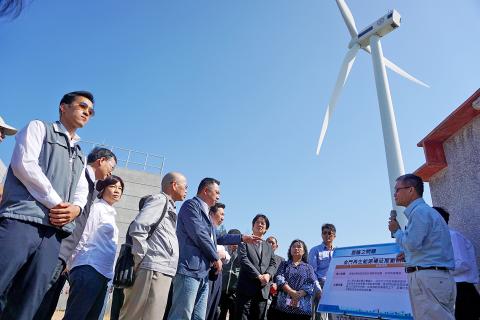There are no plans for an electricity rate hike even though the nation is transitioning to renewable energy, the Cabinet said yesterday as Premier William Lai (賴清德) inspected a new solar power system in Kinmen County.
There are no plans for a rate hike because the cost of renewable energy will drop dramatically with technological advances, Cabinet spokesman Hsu Kuo-yung (徐國勇) said.
The new solar power system in Kinmen is 50 percent more efficient than the one installed eight years ago and had a lower construction cost, Hsu said.

Photo: CNA
Renewable power plants have no fuel costs; the only costs are construction, operation and maintenance expenses, which are more affordable than the operational and maintenance costs of a traditional power plant, Hsu said.
While the availability of land is an issue for solar power plants, offshore wind farms can boost the nation’s “green” energy ratio, he said.
The local wind energy sector is estimated to attract up to NT$1.5 trillion (US$49.6 billion) in investment and major international wind farm developers have come to Taiwan seeking to harvest wind power in the Taiwan Strait, Hsu said.
The experiences of wind power development in Taiwan could be applied to Kinmen, he added.
Kinmen is a Cabinet-designated “low-carbon island” where efforts will be made to power the county with solar and wind energy, Lai said.
“It is not a slogan, but a program to be accomplished,” he added.
The county government has built small solar power systems across the island, and the Cabinet is to launch a program to encourage households to install rooftop solar panels to alleviate power shortages and attain the goal of phasing out nuclear power by 2025.
Kinmen should be among the first areas where an extensive solar network is constructed, Lai said.
In response to Vice President Chen Chien-jen’s (陳建仁) remark that it is possible to phase out coal power by 2050, Hsu said that Chen referred to a German estimate that could not be applied to Taiwan.
Germany’s renewable energy development is far ahead of Taiwan’s, Hsu added.
He reiterated the government’s goal of raising the share of green energy to 20 percent of the total while reducing the share of coal to 30 percent, with natural gas making up the remaining 50 percent.
The nation would use low-sulfur coal and commission ultra-supercritical power generators to reduce air pollution, Hsu added.

The Ministry of Economic Affairs has fined Taobao NT$1.2 million (US$36,912) for advertisements that exceed its approved business scope, requiring the Chinese e-commerce platform to make corrections in the first half of this year or its license may be revoked. Lawmakers have called for stricter enforcement of Chinese e-commerce platforms and measures to prevent China from laundering its goods through Taiwan in response to US President Donald Trump’s heavy tariffs on China. The Legislative Yuan’s Finance Committee met today to discuss policies to prevent China from dumping goods in Taiwan, inviting government agencies to report. Democratic Progressive Party Legislator Kuo Kuo-wen (郭國文) said

The Ministry of Economic Affairs has fined Taobao NT$1.2 million (US$36,900) for advertisements that exceeded its approved business scope and ordered the Chinese e-commerce platform to make corrections in the first half of this year or its license would be revoked. Lawmakers have called for stricter supervision of Chinese e-commerce platforms and more stringent measures to prevent China from laundering its goods through Taiwan as US President Donald Trump’s administration cracks down on origin laundering. The legislature’s Finance Committee yesterday met to discuss policies to prevent China from dumping goods in Taiwan, inviting government agencies to report on the matter. Democratic Progressive Party

Taiwan and its Pacific ally Tuvalu on Tuesday signed two accords aimed at facilitating bilateral cooperation on labor affairs, according to Taiwan’s Ministry of Foreign Affairs (MOFA). The governments inked two agreements in Taipei, witnessed by Foreign Minister Lin Chia-lung (林佳龍) and visiting Deputy Tuvaluan Prime Minister Panapasi Nelesone, MOFA said in a news release. According to MOFA, the agreements will facilitate cooperation on labor issues and allow the two sides to mutually recognize seafarers’ certificates and related training. Taiwan would also continue to collaborate with Tuvalu across various fields to promote economic prosperity as well as the well-being of their

Sung Chien-liang (宋建樑), who led efforts to recall Democratic Progressive Party (DPP) Legislator Lee Kun-cheng (李坤城), was released on bail of NT$80,000 today amid outcry over his decision to wear a Nazi armband to questioning the night before. Sung arrived at the New Taipei District Prosecutors’ Office for questioning in a recall petition forgery case last night wearing a red armband bearing a swastika, carrying a copy of Adolf Hitler’s Mein Kampf and giving a Nazi salute. Sung left the building at 1:15am without the armband and covering the book with his coat. Lee said today that this is a serious